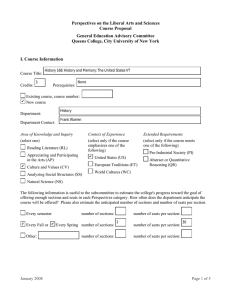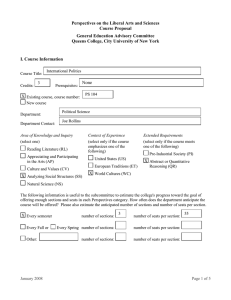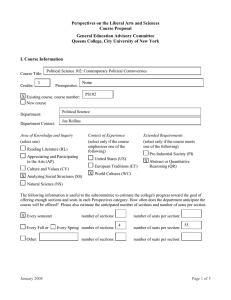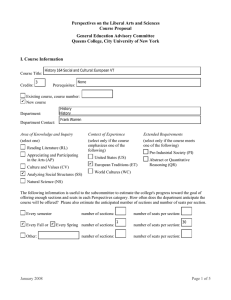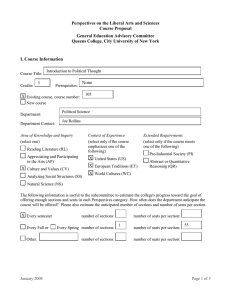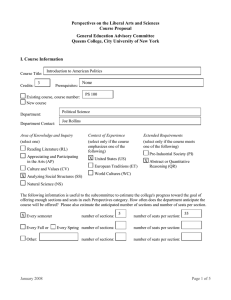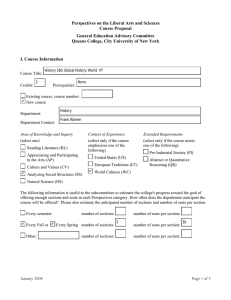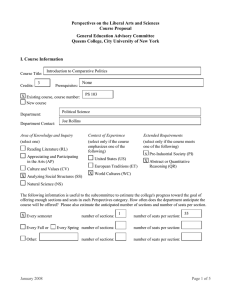Perspectives on the Liberal Arts and Sciences Course Proposal
advertisement
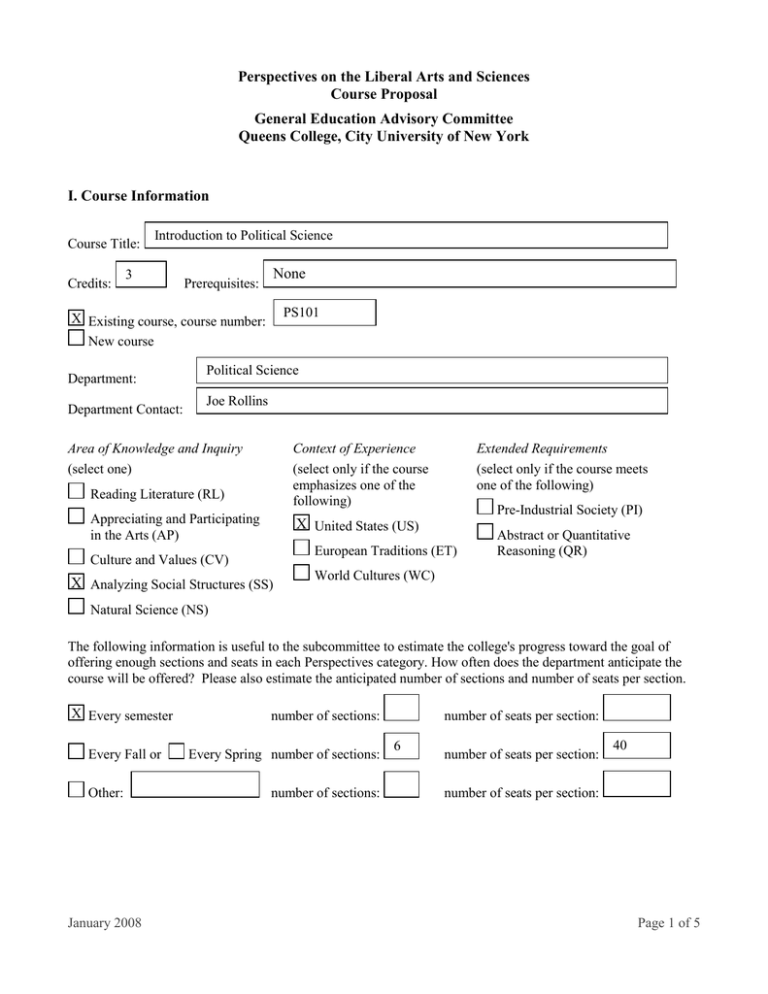
Perspectives on the Liberal Arts and Sciences Course Proposal General Education Advisory Committee Queens College, City University of New York I. Course Information Course Title: Credits: Introduction to Political Science 3 Prerequisites: None PS101 X Existing course, course number: New course Department: Department Contact: Political Science Joe Rollins Area of Knowledge and Inquiry (select one) Context of Experience (select only if the course emphasizes one of the following) Reading Literature (RL) Appreciating and Participating in the Arts (AP) Extended Requirements (select only if the course meets one of the following) Pre-Industrial Society (PI) X United States (US) European Traditions (ET) Culture and Values (CV) X Analyzing Social Structures (SS) Abstract or Quantitative Reasoning (QR) World Cultures (WC) Natural Science (NS) The following information is useful to the subcommittee to estimate the college's progress toward the goal of offering enough sections and seats in each Perspectives category. How often does the department anticipate the course will be offered? Please also estimate the anticipated number of sections and number of seats per section. X Every semester Every Fall or Other: January 2008 number of sections: Every Spring number of sections: number of sections: number of seats per section: 6 number of seats per section: 40 number of seats per section: Page 1 of 5 Course Description Please include a course description. If the course will include variable topics or be taught in various forms, please provide as many descriptions of specific sections as possible. Political Science 101 is designed to introduce students to the discipline itself and therefore approaches its subject matter broadly. The discipline is traditionally subdivided into the following categories: American Politics (AP), International Relations (IR), Comparative Politics (CP), and Political Theory (PT). In most departments, each of these subfields is further divided to focus on specific institutions and methods. For example, AP is normally comprised of the following: The Presidency, Congress, Courts/Public Law, Public Administration and Public Policy, State and Local Government; CP breaks down by region of the globe. Because the discipline also splits between scholars with different methodological talents and interests (i.e., quantitative or qualitative), an introduction to the discipline, such as PS101, is, by necessity, interdisciplinary, satisfies multiple PLAS goals, and will change emphasis depending upon the instructor. All iterations of the course, however, will touch upon textual exegesis as well as qualitative research, and introduce students to the building blocks of quantitative reasoning. This latter element will, in most instances, be as basic as instructing students on the basic elements of logic (e.g., the rhetorical strategy commonly used in legal opinions), or, in other instances, students will be introduced to the fundamentals of research design (e.g., formulating research questions, thinking about how to answer those questions, how to gather the information required, and how to draw analytic conclusions from the material collected). These elements of the course are intended to introduce students to the theoretical, abstract reasoning, and quantitative methods of the discipline. As the attached syllabus demonstrates, the course will be parsed into various sections including: Theory (emphasizing power and ideology); History (which will focus on different periods and geographic regions relative to the professor’s expertise); Methods (some faculty will emphasize qualitative methods and textual analysis including literature, film, or popular culture, others will be more concerned with empiricism and quantitative analyses; all sections will introduce students to these ideas and variation will be a matter of emphasis); Institutions (here, again, different faculty will focus on different levels of government ranging from the local to the international levels of analysis); Processes (depending on the professor’s expertise this section will include studies of elections, litigation, diplomacy, dispute resolution, war, etc.); Case Studies (possible topics for this section will include specific wars, legal issues, electoral cycles, ongoing disputes in various regions, or specific political problems such as the drug trade, terrorism, political corruption, etc.). As with all courses in the field, our primary concern will be on politics and the state. Although we will draw from other fields (both empirical and theoretical) from across the social sciences, our emphasis on the state and governance distinguishes Political Science 101 from other potentially comparable courses in the social sciences. January 2008 Page 2 of 5 II. Criteria for Perspectives Courses Justification Please describe how the course will address criteria for Perspectives on the Liberal Arts and Sciences courses. Be sure to include an explanation of the course’s specific learning goals for students to make a connection between these and the general criteria for Perspectives courses. The focal question of PS 101 is basic to the discipline as a whole: Who gets what, when, where, and why, and who gets left out? Probing this deceptively simple question calls for a theoretical framework, a methodological strategy, and empirical materials for analysis. Syllabi for this course will require students to engage a critical reading of appropriate texts, essays, legal cases, and/or films. The methodological section of the course will instruct them on ways to conduct research in the field. Specifically, students will—both explicitly and implicitly—learn how the discipline frames questions, states hypotheses, and tests their utility. By the end of the semester, students will have been introduced to the multiple ways that Political Scientists—as a group—approach the subject of their field. Applying the works of thinkers who span the range of political theory, e.g., Marx, Weber, Locke, Hobbes, Foucault, Habermas, Fanon, de Tocqueville, Publius, to contemporary problems represented in multiple “texts” the course will offer students a wide-ranging and broad introduction to the discipline, will show how knowledge is created within the field, and how that knowledge is then applied to contemporary socio-political issues. Because the work of these theorists is also important in other disciplines, emphasis on their political (as opposed to social, economic, or philosophical) influence will contextualize the knowledge formation practices of Political Science within the liberal arts generally and will allow students to see how those practices inform the political elements of their community and its place in a global society. Criteria Checklist Please be sure that your justification addresses all three criteria 1-3, below. For criteria 4-8, please check all that apply and discuss these in your justification. A Perspectives course must: 1. Be designed to introduce students to how a particular discipline creates knowledge and understanding. 2. Position the discipline(s) within the liberal arts and the larger society. 3. Address the goals defined for the particular Area(s) of Knowledge the course is designed to fulfill. In addition, a Perspectives course will, where appropriate to its discipline(s) and subject matter: X 4. Be global or comparative in approach. X 5. Consider diversity and the nature and construction of forms of difference. X 6. Engage students in active inquiry. X 7. Reveal the existence and importance of change over time. X 8. Use primary documents and materials. January 2008 Page 3 of 5 III. Course Materials, Assignments, and Activities Please provide an annotated list of course readings and descriptions of major assignments or exams for the course, as well as distinctive student activities that will engage students in working toward the course goals discussed in the course description and/or justification. Please include the author and title for each reading or text, along with a short description providing information about how the reading will contribute to course goals. See attached example syllabus. IV. Assessment Perspectives courses must be recertified every five years, and we are seeking ideas for how to best carry out this assessment. What forms of evidence that the course is meeting its goals as a Perspectives course would be appropriate to collect for this course during the next five years? How would you prefer assessment to be conducted? How might evidence of effective teaching and student learning be collected and evaluated? Assessment is part of the Political Science Department’s overall strategy for measuring our success. As part of our ongoing commitment to maintaining high teaching standards, we regularly collect samples of written work from our students so that we may track their development across not only the span of a student’s undergraduate education, but across student cohorts by using a time-series sampling design. Findings from this project allow the department’s Curriculum Committee to monitor the progress and development of our undergraduate majors, as well as stay to stay abreast of our success as teachers. Papers assigned for this class will be part of that overall program. January 2008 Page 4 of 5 V. Administration What process will your department develop to oversee this course, suggest and approve changes, and conduct assessment? Who will be in charge of this process? Also indicate whether the course will be primarily taught by full-time or adjunct faculty, or by a combination of the two types of instructor. For a description of the processes already in place, please see above at IV. Administration of the assessment project is overseen by the Department’s Curriculum Committee. Syllabi for all courses taught in the Department are collected and made available for review by new, incoming instructors. All new instructors will be required to meet with members of the Curriculum Committee whose research and teaching are within their subfield in advance of the semester when a PLAS course will be taught. At these meetings, the interdisciplinary, pedagogic, and cultural goals of PLAS will be spelled out in detail so that new teachers may incorporate those requirements into their syllabi. Before syllabi are sent to Reprogrpahics for mass production several weeks in advance of the semester, new instructors will be asked to submit them to the Department Curriculum Committee for vetting and approval. The course is taught by a combination of full-time and adjunct faculty. VI. Syllabus Please attach a sample syllabus (or set of syllabi, for courses on variable topics or courses that will be taught in variable formats). Some resources to guide syllabus construction: The Provost's page outlining guidelines for syllabi: http://qcpages.qc.cuny.edu/provost/Cur_stud/Syllabus expectations.htm Sample syllabi for W courses, from Writing Across the Curriculum: http://qcpages.qc.cuny.edu/writing/wsyllabi.htm Goals for Student Writing at Queens College: http://qcpages.qc.cuny.edu/writing/Goals.htm Harvard’s Bok Center for Teaching and Learning, suggestions for syllabus planning: http://isites.harvard.edu/icb/icb.do?keyword=k1985&pageid=icb.page29695 Lehman College’s Gen Ed Syllabi Project: http://www.lehman.edu/lehman/programs/generaledu/gened_syllabi_project.html Submit this completed form and a sample syllabus (or set of syllabi) by email to Eva Fernández (eva.fernandez@qc.cuny.edu), Director, Center for Teaching and Learning. January 2008 Page 5 of 5
